-
 Bitcoin
Bitcoin $113900
-1.39% -
 Ethereum
Ethereum $3517
-4.15% -
 XRP
XRP $3.009
1.59% -
 Tether USDt
Tether USDt $0.9997
-0.04% -
 BNB
BNB $766.8
-1.41% -
 Solana
Solana $164.6
-2.38% -
 USDC
USDC $0.9998
-0.02% -
 TRON
TRON $0.3277
0.65% -
 Dogecoin
Dogecoin $0.2023
-1.67% -
 Cardano
Cardano $0.7246
0.05% -
 Hyperliquid
Hyperliquid $38.27
-4.77% -
 Sui
Sui $3.528
-0.52% -
 Stellar
Stellar $0.3890
-0.73% -
 Chainlink
Chainlink $16.16
-2.69% -
 Bitcoin Cash
Bitcoin Cash $539.9
-4.38% -
 Hedera
Hedera $0.2425
-2.00% -
 Avalanche
Avalanche $21.71
-0.97% -
 Toncoin
Toncoin $3.662
5.73% -
 Ethena USDe
Ethena USDe $1.000
-0.02% -
 UNUS SED LEO
UNUS SED LEO $8.964
0.35% -
 Litecoin
Litecoin $107.7
2.33% -
 Shiba Inu
Shiba Inu $0.00001223
-0.40% -
 Polkadot
Polkadot $3.617
-0.97% -
 Uniswap
Uniswap $9.052
-2.49% -
 Monero
Monero $295.1
-3.79% -
 Dai
Dai $0.9999
0.00% -
 Bitget Token
Bitget Token $4.315
-1.85% -
 Pepe
Pepe $0.00001060
0.11% -
 Cronos
Cronos $0.1342
-2.72% -
 Aave
Aave $256.0
-0.87%
How to buy Bitcoin ETF through a broker?
Bitcoin ETFs track Bitcoin's price without direct ownership, offering exposure through brokerage accounts. Choose a reputable broker, research fees, and understand risks before investing.
Mar 30, 2025 at 10:50 am
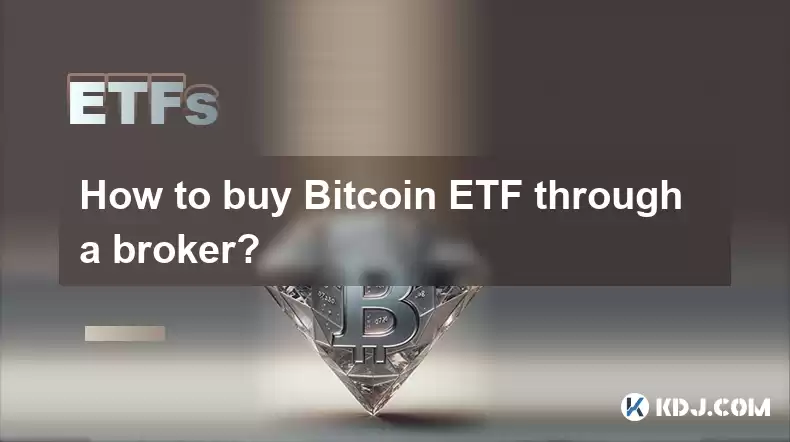
Understanding Bitcoin ETFs and Brokerage Accounts
Before diving into the process, it's crucial to understand what a Bitcoin ETF is and how brokerage accounts facilitate its purchase. A Bitcoin ETF (Exchange-Traded Fund) is a fund that tracks the price of Bitcoin, offering investors exposure to the cryptocurrency without directly owning it. This is unlike buying Bitcoin directly on an exchange. Brokerage accounts provide a platform to buy and sell various financial instruments, including ETFs. Choosing a reputable broker with a robust platform is paramount. Not all brokers offer access to all ETFs, so research is key.
Choosing the Right Broker and Bitcoin ETF
Selecting a suitable broker depends on several factors. Consider factors like trading fees, account minimums, available research tools, and the specific Bitcoin ETF they offer. Many well-known brokers offer a range of Bitcoin ETFs. It's important to compare fees as they can significantly impact your returns. Research the ETF's expense ratio as well; this represents the annual cost of holding the ETF. Finally, ensure the broker is regulated and trustworthy to protect your investments.
Step-by-Step Guide to Purchasing a Bitcoin ETF
The process of buying a Bitcoin ETF through a broker is generally straightforward. However, the exact steps might vary slightly depending on the broker you choose. Here's a general outline:
Open a Brokerage Account: If you don't already have one, you'll need to open an account with a brokerage that offers the Bitcoin ETF you want to buy. This usually involves providing personal information and potentially undergoing a verification process.
Fund Your Account: Once your account is open, you'll need to deposit funds. Most brokers offer various funding methods, such as bank transfers, wire transfers, or debit/credit cards. Check the minimum deposit requirements before funding.
Search for the Bitcoin ETF: Use the broker's search function to locate the specific Bitcoin ETF you wish to purchase. Pay close attention to the ticker symbol to ensure you're buying the correct asset.
Place Your Order: Specify the number of shares you want to buy and place your order. You can choose between market orders (buying at the current market price) or limit orders (buying only at a specific price or better).
Review and Confirm: Before finalizing the purchase, carefully review the order details, including the price, quantity, and total cost. Confirm the order to execute the transaction.
Understanding Risks Associated with Bitcoin ETFs
While Bitcoin ETFs offer a relatively convenient way to gain exposure to Bitcoin, it's crucial to acknowledge the inherent risks. Bitcoin's price is notoriously volatile, meaning the value of your investment can fluctuate significantly in short periods. Diversification is crucial to mitigate risk. Don't invest more than you can afford to lose. Furthermore, regulatory changes affecting cryptocurrencies could impact the ETF's price. Thorough research is vital before investing.
Tax Implications of Bitcoin ETF Investments
The tax implications of investing in Bitcoin ETFs depend on several factors, including your jurisdiction and holding period. Capital gains taxes are typically applicable when you sell your ETF shares at a profit. The tax rate varies depending on how long you held the investment. Consult a tax professional for personalized advice, as tax laws are complex and vary by location. Accurate record-keeping is essential for tax reporting purposes. Understanding tax liabilities is critical for responsible investing.
Security Considerations When Using Brokerage Accounts
Security is paramount when dealing with any financial instrument, including Bitcoin ETFs. Choose a broker with a strong reputation for security measures. Use strong passwords and enable two-factor authentication to protect your account from unauthorized access. Regularly review your account statements for any suspicious activity. Be wary of phishing scams and avoid clicking on suspicious links or providing personal information to untrusted sources.
Frequently Asked Questions
Q: Are Bitcoin ETFs the same as buying Bitcoin directly?
A: No. Bitcoin ETFs track the price of Bitcoin but don't involve direct ownership of the cryptocurrency. You're investing in a fund that holds Bitcoin, not the Bitcoin itself.
Q: What are the fees associated with buying and holding Bitcoin ETFs?
A: Fees vary depending on the broker and the specific ETF. These fees can include trading commissions, expense ratios (annual fees charged by the ETF), and potentially other charges.
Q: Are Bitcoin ETFs regulated?
A: The regulatory landscape for Bitcoin ETFs varies by jurisdiction. However, most reputable brokers only offer ETFs that comply with relevant regulations.
Q: What are the risks associated with investing in Bitcoin ETFs?
A: The primary risk is Bitcoin's price volatility. Other risks include regulatory changes affecting cryptocurrencies and the potential for counterparty risk with the ETF provider.
Q: How do I choose the right Bitcoin ETF?
A: Consider factors such as the ETF's expense ratio, tracking performance, and the reputation of the issuer. Compare different ETFs to find one that aligns with your investment goals and risk tolerance.
Q: Can I buy fractional shares of a Bitcoin ETF?
A: Many brokers allow you to buy fractional shares of ETFs, making it accessible even with smaller investment amounts. Check with your broker to confirm their policy.
Q: What happens if the broker I use goes bankrupt?
A: In the event of a broker's bankruptcy, the Securities Investor Protection Corporation (SIPC) in the US may cover a portion of your investment, up to certain limits. However, this protection may not cover all assets or all losses.
Q: Are there tax advantages to investing in Bitcoin ETFs compared to buying Bitcoin directly?
A: Tax implications can vary significantly depending on your jurisdiction and individual circumstances. Consult a tax professional for advice tailored to your situation. There's no inherent tax advantage or disadvantage.
Disclaimer:info@kdj.com
The information provided is not trading advice. kdj.com does not assume any responsibility for any investments made based on the information provided in this article. Cryptocurrencies are highly volatile and it is highly recommended that you invest with caution after thorough research!
If you believe that the content used on this website infringes your copyright, please contact us immediately (info@kdj.com) and we will delete it promptly.
- Bitcoin Strategy: Saylor's Not Hoarding, He's Building an Empire
- 2025-08-02 22:30:12
- Bitcoin Bloodbath: Macro Pressures and Liquidations Unleash Crypto Chaos
- 2025-08-02 22:30:12
- Worldcoin, Identity, WLD Price: Decoding the NYC Crypto Buzz
- 2025-08-02 21:10:12
- Shiba Inu: Utility and Community Strength Drive Crypto's Evolution
- 2025-08-02 21:50:12
- Crypto Donations, Trump PAC, and Bitcoin: A New York Minute on Political Coin
- 2025-08-02 20:30:12
- Crypto Market Under Pressure: Bearish Momentum and Rising Volatility Take Hold
- 2025-08-02 20:30:12
Related knowledge
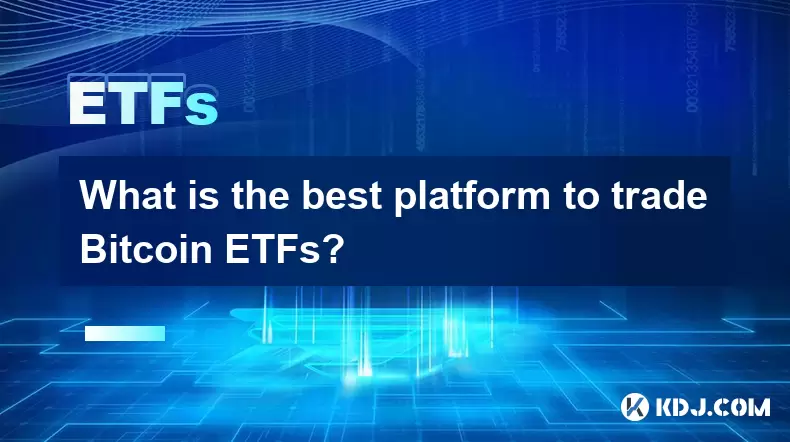
What is the best platform to trade Bitcoin ETFs?
Jul 23,2025 at 04:14am
Understanding Bitcoin ETFs and Their Role in TradingBitcoin Exchange-Traded Funds (ETFs) have gained significant traction among traditional and crypto...
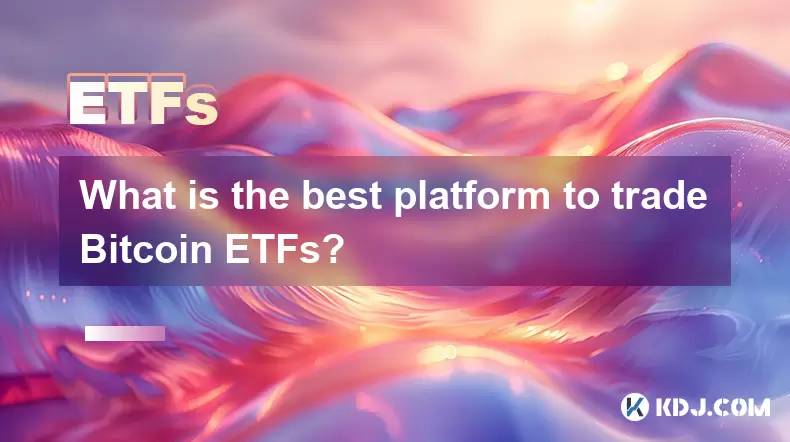
What is the best platform to trade Bitcoin ETFs?
Jul 17,2025 at 03:50pm
Understanding Bitcoin ETFs and Their Role in the MarketBitcoin Exchange-Traded Funds (ETFs) are investment vehicles that track the price of Bitcoin wi...
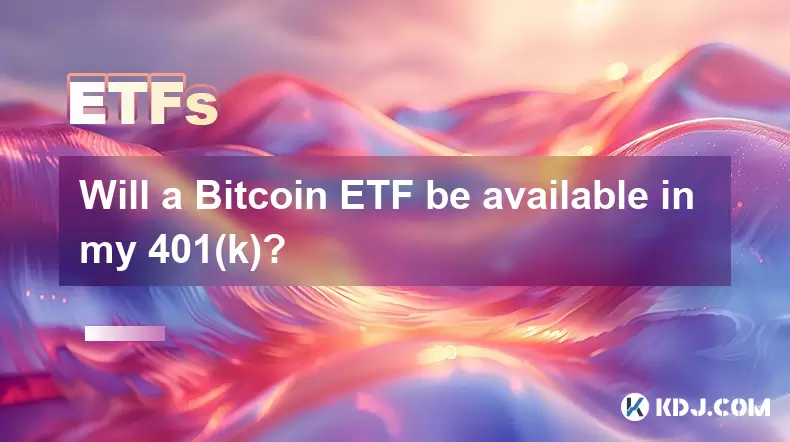
Will a Bitcoin ETF be available in my 401(k)?
Jul 17,2025 at 10:42pm
What is a Bitcoin ETF?A Bitcoin ETF (Exchange-Traded Fund) is an investment vehicle that tracks the price of Bitcoin without requiring investors to di...
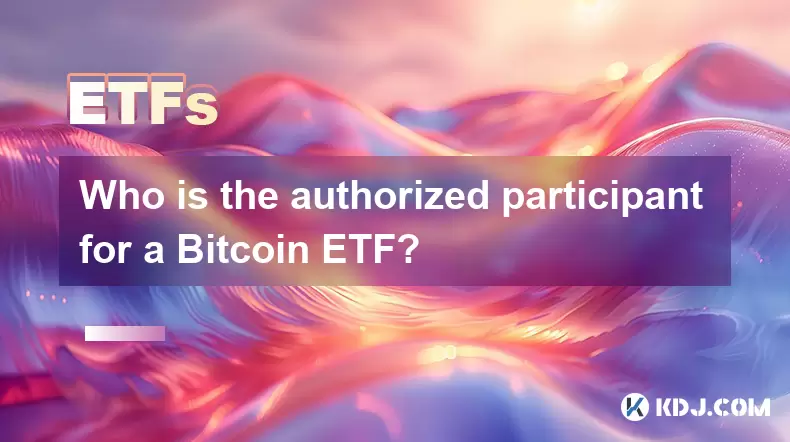
Who is the authorized participant for a Bitcoin ETF?
Jul 18,2025 at 12:42am
Understanding the Role of Authorized Participants in Bitcoin ETFsIn the context of Bitcoin Exchange-Traded Funds (ETFs), an authorized participant (AP...
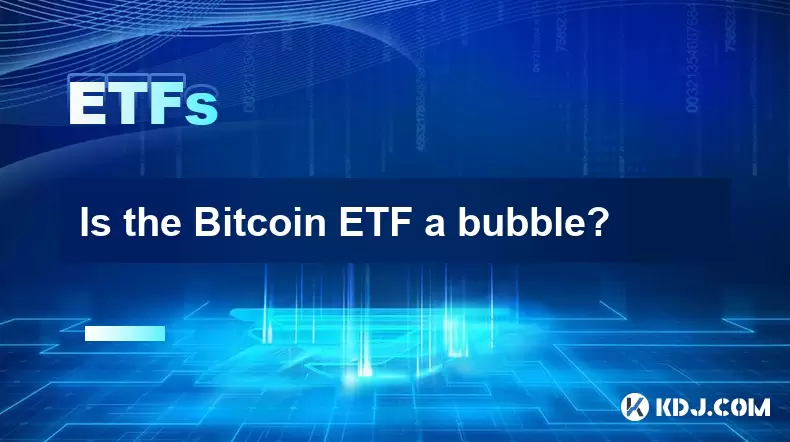
Is the Bitcoin ETF a bubble?
Jul 20,2025 at 06:57am
Understanding the Bitcoin ETF ConceptA Bitcoin Exchange-Traded Fund (ETF) is a financial product that aims to track the price of Bitcoin without requi...
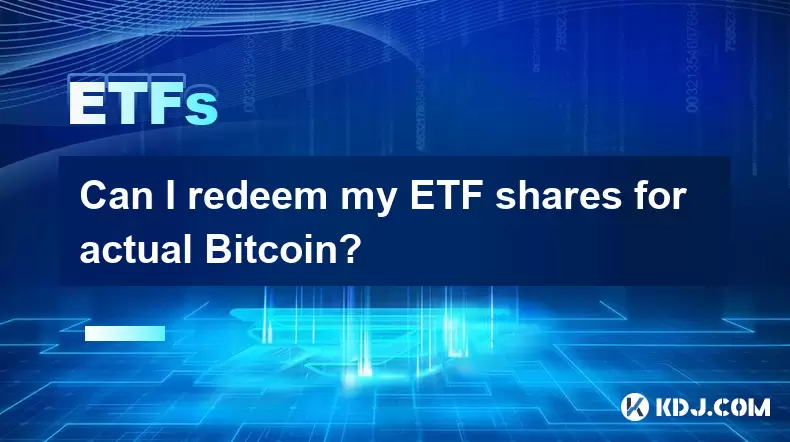
Can I redeem my ETF shares for actual Bitcoin?
Jul 17,2025 at 03:14pm
Understanding ETF Shares and Their Relation to BitcoinExchange-Traded Funds (ETFs) have become a popular investment vehicle for those looking to gain ...

What is the best platform to trade Bitcoin ETFs?
Jul 23,2025 at 04:14am
Understanding Bitcoin ETFs and Their Role in TradingBitcoin Exchange-Traded Funds (ETFs) have gained significant traction among traditional and crypto...

What is the best platform to trade Bitcoin ETFs?
Jul 17,2025 at 03:50pm
Understanding Bitcoin ETFs and Their Role in the MarketBitcoin Exchange-Traded Funds (ETFs) are investment vehicles that track the price of Bitcoin wi...

Will a Bitcoin ETF be available in my 401(k)?
Jul 17,2025 at 10:42pm
What is a Bitcoin ETF?A Bitcoin ETF (Exchange-Traded Fund) is an investment vehicle that tracks the price of Bitcoin without requiring investors to di...

Who is the authorized participant for a Bitcoin ETF?
Jul 18,2025 at 12:42am
Understanding the Role of Authorized Participants in Bitcoin ETFsIn the context of Bitcoin Exchange-Traded Funds (ETFs), an authorized participant (AP...

Is the Bitcoin ETF a bubble?
Jul 20,2025 at 06:57am
Understanding the Bitcoin ETF ConceptA Bitcoin Exchange-Traded Fund (ETF) is a financial product that aims to track the price of Bitcoin without requi...

Can I redeem my ETF shares for actual Bitcoin?
Jul 17,2025 at 03:14pm
Understanding ETF Shares and Their Relation to BitcoinExchange-Traded Funds (ETFs) have become a popular investment vehicle for those looking to gain ...
See all articles

























































































